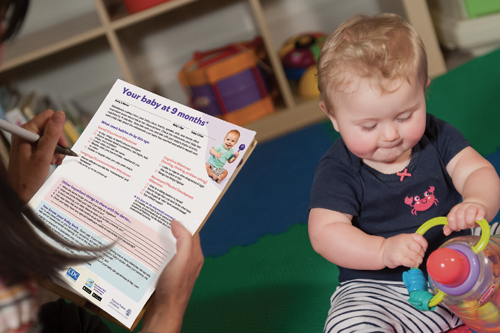What is Developmental Monitoring?
WIC Staff are well-positioned to engage, educate, and empower families to track their child’s developmental milestones and take action to help their child when there’s a possible concern. Supporting families is what WIC does best!
First, what are developmental milestones?

Developmental milestones are skills that most children achieve by a certain age. Children reach milestones in how they play, learn, speak, act, and move. Skills such as smiling by 2 months, walking with help by age 1, and waving “bye-bye” by 18 months are some common developmental milestones, though there are many more.
Children develop at their own pace, so it’s difficult to tell exactly when a child will learn a given skill. However, age-specific developmental milestones give a general idea of the skills to expect. The milestones included in CDC’s developmental milestone checklists reflect what MOST (estimated between 75% – 90%) children achieve by a given age.
Developmental monitoring is tracking when or whether a child reaches the milestones that are expected by his or her age. It is something parents and other caregivers can do, on a regular and ongoing basis. Doing so provides important information about a child’s developmental health. Using CDC’s developmental milestone checklists makes it easy!
Why Monitor Developmental Milestones?
Monitoring developmental milestones using a simple milestone checklist helps parents know what skills are typical at their children’s ages and what to expect next. It also helps them to know when to act if they have a concern or if there are signs of possible developmental delay or disability, so they and their children can get the services and supports they need as early as possible.
Parents know their children best. If a child is not meeting the milestones for his or her age, or if WIC staff or a parent think there could be a problem with a child’s development, it is important that the child be referred to their primary healthcare provider or another program for developmental screening and follow-up. WIC staff can help parents monitor their children’s development and support them in taking action when there is a concern.
How Common are Developmental Disabilities?
Developmental disabilities among children and youth are quite common and are a significant public health issue.
- 1 in 6 children aged 3–17 years have developmental disabilities—conditions that affect how children play, learn, speak, act, or move for their age.
- Many children with a developmental disability are not identified until after they start school.
- Children from families with low incomes, like those served by WIC, are at even greater risk.
How Can the WIC Milestone Checklist Program Promote Child Development?
Integrating the Milestone Checklist Program into WIC has been shown to:
- Increase parental reports of learning about early child development;
- Increase early identification of children with developmental delays and disabilities so children and families can get the services and supports they need; and
- Enhance collaborative efforts between WIC and community service providers to improve screening and referral to early intervention services.